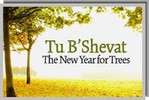
Tu B'shvat
Worship
Shabbat
Holidays
Rosh Hashanah
Yom Kippur
Sukkot
Simchat Torah & Shemini Atzeret
Chanukah
Tu B'Shvat
Purim
Pesach
Shavuot
Tisha B'Av
A NEW YEAR FOR TREES
Tu Bishvat is a holiday intimately connected to the agricultural cycle of the Land of Israel. Falling in the middle of the Jewish month of Shvat, the 15th day of the month is the New Year of Trees. Today, this holiday is often celebrated by planting saplings and also by participating in a seder-meal that echoes the Passover seder, in which the produce of trees, including fruits and nuts, are eaten.
Ideas and Beliefs
The Bible expresses a great reverence for fruit trees as symbols of God's bounty and beneficence. Special laws were formulated to protect fruit trees in times of war and ensure that the produce of trees would not be picked until the trees were mature enough and tithes were given from them. In order to calculate the age of trees, both for determining when they could be harvested and when they were to be tithed for the Temple, the Talmudic Rabbis established the 15th day (Tu) of the month of Shvat as the official "birthday" of trees.
Subsequent to the destruction of the Temple, Tu Bishvat lost much of its relevance, but in the middle ages it was rediscovered by Jewish mystics. In the modern period it has enjoyed another revival as a holiday that links Jews with the land of Israel and as a Jewish celebration of the environment.
Practices
Tu bishvat quiz: When the Temple stood in Jerusalem, Tu Bishvat served as the day on which farmers offered the first fruits of the trees they planted, after the trees had turned four years old. The following Tu Bishvat signified when the farmers were allowed to begin making use of the produce of the trees they planted, whether for personal or economic reasons.
In the middle ages, the Jewish mystics of Safed developed a ritual meal celebrated on Tu Bishvat that was modeled on the Passover seder. Four cups of wine were drunk and seven "fruits" symbolic of those of the Holy Land were eaten. With the rise of Zionism in the late 19th century, Tu Bishvat was rediscovered as a celebration that links the Jews with their land. The holiday became one of rededication to the ecology of the denuded land, with the planting of trees taking center stage in the celebration. Jews outside of Israel contribute money to plant trees there and/or plant trees in their own communities.
With the increased concern for the environment in recent years, Tu Bishvat has taken on an additional meaning as a day on which Jews can express and act on their concern for the ecological well-being of the world in which we live. This has led to the rediscovery of the mystical Tu Bishvat seder, now transformed into a celebration of God's bounty and the environment.
Material from "My Jewish Learning"

